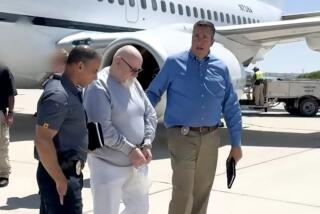Judges OK Use of DNA Evidence in State Courts : Jurisprudence: The ruling in the robbery and murder case of a Ventura woman opens the door to increased ‘genetic fingerprinting.’
- Share via
For the first time in California, a state appeal court in Ventura upheld the reliability of DNA evidence Tuesday, clearing the way for widespread use of so-called “genetic fingerprinting” in court.
In an unanimous decision, a three-judge panel of the 2nd District Court of Appeal ruled that DNA evidence is valid and was properly used in the 1989 robbery and murder conviction of a Ventura woman, Lynda P. Axell.
“This paves the way for prosecutors throughout California to utilize this evidence, both to convict the guilty and to clear the innocent,” Ventura County Dist. Atty. Michael D. Bradbury said. He said the decision will govern courts statewide unless a different appeal court issues a contrary opinion.
In that case, the state Supreme Court would decide the issue. Appellate courts in eight states have already approved the use of DNA evidence.
DNA evidence relies on a principle that has become widely accepted among most of the scientific community: that no two people have the same genetic coding. Experts say they can extract genetic material known as DNA--or deoxyribonucleic acid--from hair, semen or skin particles left at a crime scene and tell whether it matches DNA from a suspect.
Critics, however, say DNA is sound in theory but subject to error in practice. Some have expressed fear that juries will be unduly swayed by fancy-sounding scientific testimony that is presented as infallible.
In the Ventura County case, 63-year-old George White was found stabbed to death Feb. 24, 1988, at the Top Hat hamburger stand in downtown Ventura. Clutched in the dead man’s hand were several long, dark strands of hair, apparently ripped from the head of his attacker.
Axell, who worked across the street from the burger stand, was immediately considered a suspect because she was seen driving away about the time of the murder. Axell admitted to police that she was using cocaine heavily at the time, and relatives maintained--and later denied--that she had admitted killing White after he caught her stealing money from the restaurant.
That evidence was not enough for a conviction, Deputy Dist. Atty. Carol J. Nelson said.
But Nelson also had the hairs. She sent the strands, along with a sample of Axell’s blood, to Cellmark Diagnostics, a Maryland lab. Cellmark found that the DNA patterns of the blood and the hairs were identical. Lab officials said the odds that the hairs came from someone other than Axell were 1 in 6 billion.
To use the evidence at Axell’s trial, Nelson had to convince Ventura County Superior Court Judge Lawrence Storch that DNA evidence was accepted in the scientific community and that the probabilities claimed by Cellmark were reasonable. After several hearings where 11 prosecution experts testified about the reliability of DNA testing, Storch ruled that the evidence was valid.
“The bottom line in this type of technique is whether there’s a risk of pointing the finger at the wrong person or exculpating the guilty, and I conclude . . . that the risk is slim to none,” Storch said at the time.
Storch convicted Axell in a non-jury trial and sentenced her to life in prison. Now 37, she is serving the sentence at the California Institution for Women at Frontera.
On Tuesday, in a 66-page opinion by Justice Steven J. Stone, the appeal court upheld Storch’s ruling on DNA and his conviction of Axell.
With the ruling, Nelson said, prosecutors no longer will have to go through lengthy hearings in each case to establish the validity of DNA evidence.
“I’m overjoyed,” Nelson said. “The people who should be jumping up and down are the innocent, who are not going to run the risk of being misidentified.”
She called DNA evidence “the fairest thing we’ve had in a long time. It just doesn’t lie. It will exclude the innocent every time.”
But Axell’s trial attorney, James Matthew Farley, said he still has doubts about genetic evidence. He said he questions the validity of probability estimates, such as the 1-in-6-billion odds cited in the Axell case.
“In my opinion, this is not ready to come to court. It’s too soon,” Farley said of DNA evidence. He also cited the fact that Cellmark and other genetic labs are businesses and he challenged their impartiality. He said he did not know whether the ruling will be appealed to the California Supreme Court.
Sharon M. Jones, the attorney who argued Axell’s case before the appeal court, could not be reached for comment. But in an interview earlier this year, she said that the scientific community is still divided on DNA evidence and that it is unfair to expect juries to sort out conflicting claims about its reliability.
Nelson said genetic evidence is not available in every case but predicted that it will be especially useful in rape cases, where semen is often available for testing.
The cost of the testing--about $13,000 in the Axell case--was once considered prohibitive, but Bradbury said the FBI is now providing DNA testing for local agencies. He predicted that the cost of the testing at commercial labs will come down dramatically as the technology is used more frequently.
More to Read
Sign up for Essential California
The most important California stories and recommendations in your inbox every morning.
You may occasionally receive promotional content from the Los Angeles Times.










